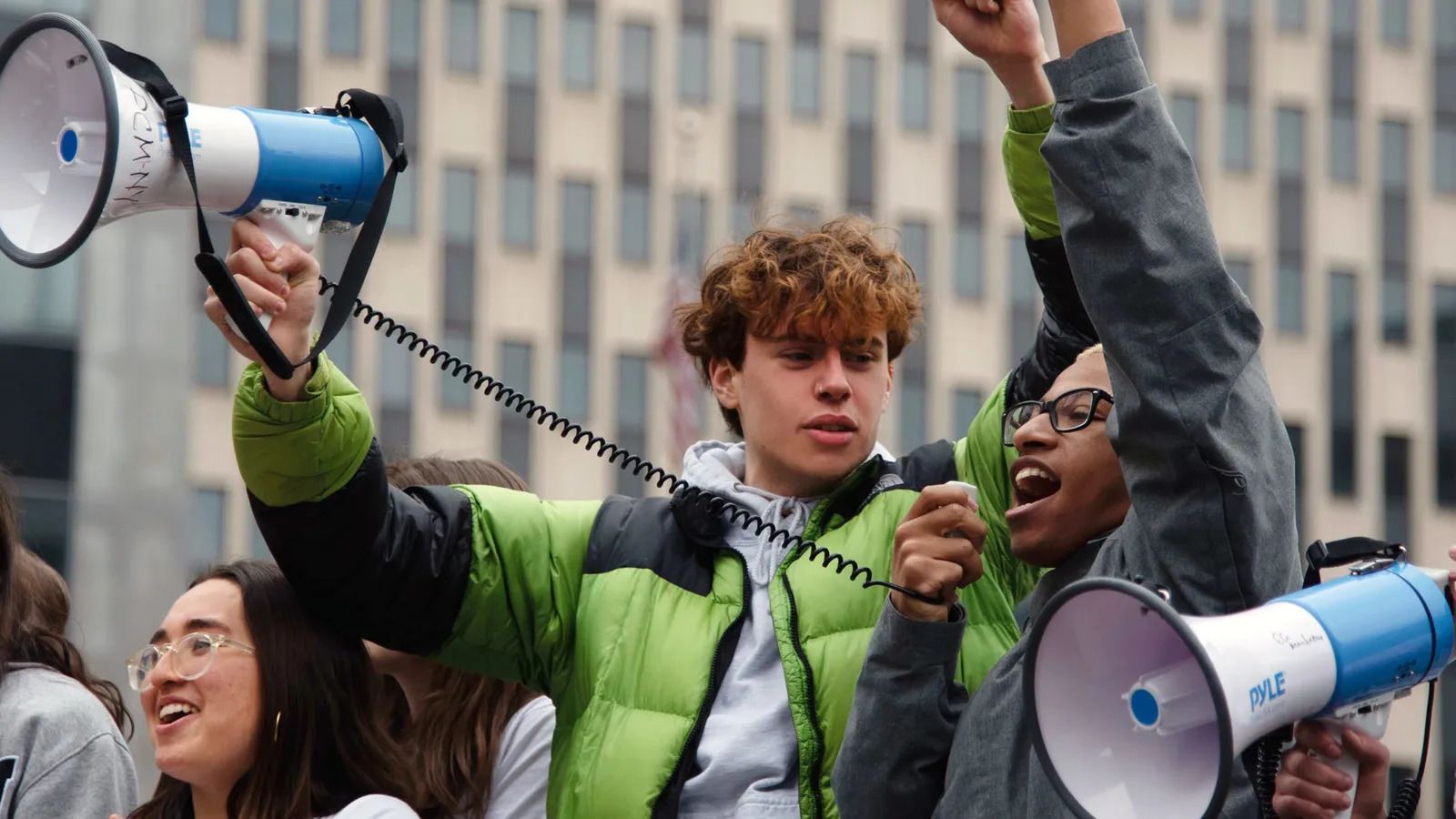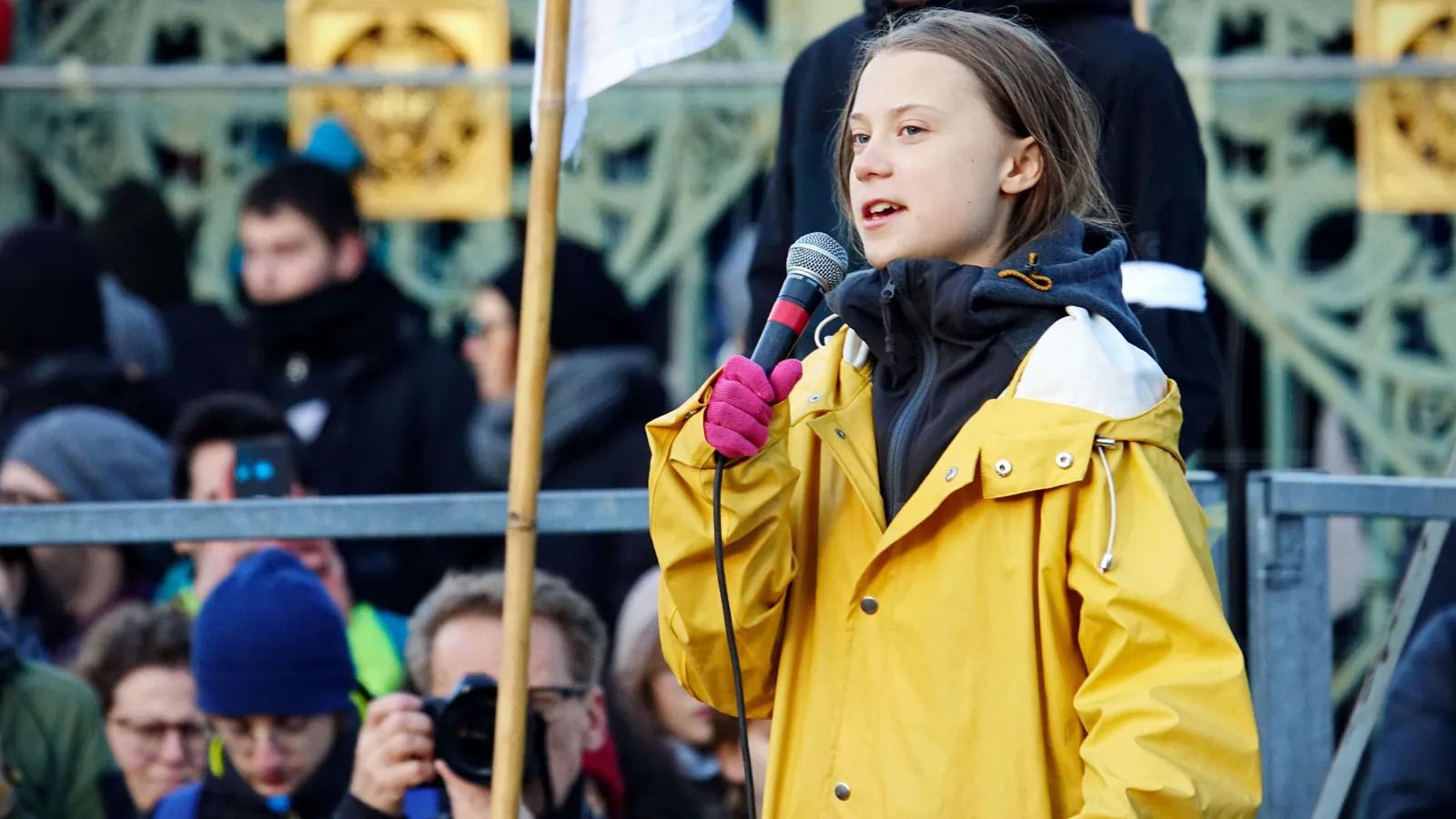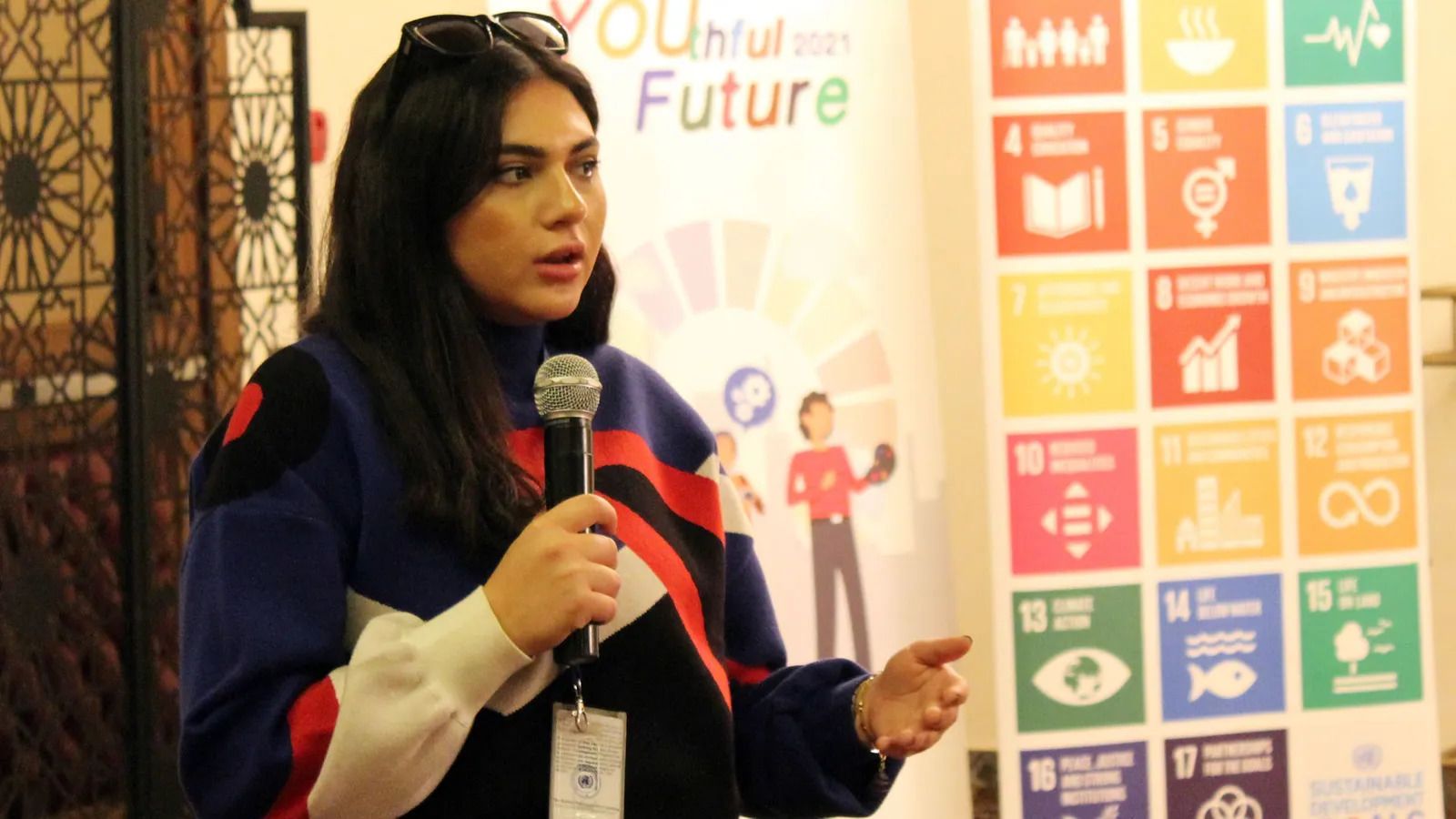Gen Z: How young people are changing activism
Elijah McKenzie-Jackson was raised as a vegetarian on animal-welfare grounds. But at 10, he began to do more research and discovered the climate impact and greenhouse gas emissions associated with rearing livestock and making animal products. “At 14, I transitioned to veganism, which helped me understand why it can’t just be personal change when fighting the climate crisis,” he says.
He knew cutting out meat and animal products wasn’t enough on its own, so at 15, McKenzie-Jackson amped up his activism efforts. He joined XR Youth, the UK-based independent wing of Extinction Rebellion, and since 2019, has been organising and participating in climate strikes with the UK Student Climate Network and the international movement Fridays for the Future. Now 18, McKenzie-Jackson has taken a one-year sabbatical from his schooling, after which he’ll move to New York City to study sociology and fine art.
McKenzie-Jackson’s experience of starting a life in activism at a young age – and going all in – is an increasingly common story among Gen Zers. Born between 1995 and 2010, this generation have already found themselves up against immense challenges as they make their way into adulthood: climate change, inequality and social unrest, political division, economic distress and more. It’s already mobilised many of these young people into action. And although they are far from the first generation who’ve spoken up about injustice and other societal ills, technology has meant Gen Z’s activism looks different than the movements of the past – which means their influence may be, too.
‘I’m powered by the fact I have no other choice’
Activism has long been synonymous with youth culture. From the May 1968 protests in France, and demonstrations against the Vietnam War and the Civil Rights Movement in the US, to the global Occupy movement and the Arab Spring of the late noughties, young people have a record of pushing forward social change. Gen Z is the latest chapter in the decades-long encyclopaedia of young activists, however this cohort appear to communicate, mobilise and rally support in a way that sets them apart from the generations before them.
Raised against the backdrop of the Great Recession of 2008, Gen Z has experienced a unique set of hurdles. Along with unprecedented societal unrest and division, their path to adulthood has been complicated by the pandemic, during which they’ve seen the rising impact of global inequality. Climate change is front and centre, threatening the future of the planet they will live on. And as the world economy enters a period of looming instability, Gen Z are increasingly bearing the brunt.
“The sense of crisis right now is amplified,” says Jessica Taft, an associate professor of Latin American and Latino Studies at the University of California, Santa Cruz whose work focuses on the political lives of children and youth across the Americas. “The extent of the climate crisis, the profound inequalities, the global creep of fascism – they are all existential threats.” Of course, there have been countless perils in the past, however the potency and global nature of these historical moments is shaping young people’s world views, and the role activism plays in their lives, she says.
 Elijah McKenzie-Jackson began his activist journey at age 10
Elijah McKenzie-Jackson began his activist journey at age 10
Fuelling Gen Z’s anxiety is the fact that they are exposed to news in a different way to their parents or grandparents at the same age; young people are consuming content around social issues and events almost constantly. With just a smartphone, people can access a 24/7 buffet of reporting through social media sites, search engines, news sites and TV. Social media is fast overtaking traditional news channels among young people. Instagram, TikTok and YouTube are now the top three most used sources for news for British teens, according to the broadcasting regulatory authority Ofcom, while older generations, who grew up consuming news through print, radio and TV still favour these traditional modes.
With tech-enabled devices providing constant access to news and user-generated content, escaping is no mean feat. Young people can’t turn away from the discourse, so it’s no wonder that many digital native Gen Zers are spurred to act on their societal grievances. They are mobilising out of fear and necessity. As 22-year-old American gun control activist and Parkland, Florida mass-shooting survivor David Hogg tweeted: “I’m not powered by hope. I’m powered by the fact I have no other choice.”
More activists, starting younger
Constant exposure to grim realities has primed Gen Zers to deal with hardship proactively.
Global data from public-relations and research firm Edelman shows 70% of Gen Zers are involved in a social or political cause. And although not all the 10,000 people surveyed said they would call themselves fully fledged activists, they’re still highly socially involved, advocating for causes they believe in through how they spend and earn. They’re the most likely generation to boycott a product, company, country or state because of a political, social or environmental stance, which extends to how they pick employers, too. Just one in five would work for a company that fails to share their values.
Much of their activism is driven by frustration – some research shows they’re generally more disillusioned with government and other forms of political participation than their elders were. The University of Cambridge has been gathering global data since 1973, and has found young people’s faith in democratic politics is now lower than any other age group. Among 18-to-34-year-olds (a mix of Gen Z and millennials), satisfaction with democracy is declining at its steepest rate. For young people in developed democracies, economic exclusion is the biggest contributor to their waning faith in institutions. Struggling with higher debt burdens, lower odds of owning a home and greater challenges in starting a family, Gen Z’s discontent only grows.
The pandemic certainly hasn’t helped. According to research by the London School of Economics and Political Science, individuals who experience an epidemic, such as Covid-19, the Zika virus, Ebola or Sars, between the ages of 18 and 25 are likely to harbour negative attitudes toward the government and elections for a long time after the epidemic is over.
Climate-change activism used to deal with abstract scientific concepts, but … we can feel climate accelerating and that adds to a sense of impending apocalypse – Subir Sinha
“While young individuals withdraw from formal politics – which is not that surprising, given their lack of trust – they also tend to increase their participation in the democratic process via alternative and more direct means,” explains Orkun Saka, co-author of the paper, visiting fellow at LSE and assistant professor of economics at City, University of London. This includes activities such as attending demonstrations, protests, boycotts and signing petitions. Saka believes the silver lining of the post-epidemic decline in trust may lead young people to feel they would like to take matters in their own hands. “They may become more critical towards their political leaders and governments, which is not a bad consequence in and of itself,” says Saka.
Particularly notable is the age at which Gen Z’s activism begins – in general, earlier than the generations that have come before them. Greta Thunberg launched her first protest outside the Swedish parliament at 15, which Subir Sinha, a lecturer in the theory and politics of development at SOAS University of London, believes set off a domino effect, whereby young people had a role model who was angry, and with good reason. “She … did not appear packaged,” he says. “It is post-celebrity activism, whereby her ordinariness and lack of glamour is part of her appeal.”
Many young activists have followed in her footsteps, gaining global recognition for speaking on climate change issues as young as eight, like Licypriya Kangujam from Manipur in India. At 10, she has just successfully campaigned to have all plastic pollution cleared from the area surrounding the Taj Mahal.
“The idea that there may not be a future, or if there is one, it could be heavily diminished, plays heavy on their minds,” says Sinha. “Climate-change activism used to deal with abstract scientific concepts, but with annual forest fires, floods, drought and record heat, plus the news and social-media coverage of all this, we can feel climate accelerating and that adds to a sense of impending apocalypse.”
This is why many young people, who see climate change as an existential threat in their lifetime, are participating so vocally in movements and demanding a seat at the table in global negotiations.
An audience at their fingertips
Gen Z activists and their older peers are united in their concern over the same issues – climate destruction, gender equality, LGBTQ+ rights – but their voices appear louder and more urgent because they have more ways to source inspiration, disseminate information and mobilise. While older generations set the precedent for grassroots activism and in-person demonstrations, Gen Zers have brought this activity into where they are most comfortable: digital spaces.
 19-year-old Swedish activist Greta Thunberg is one of the most
high-profile Gen Z voices, whom experts believe has inspired other young
people to take action
19-year-old Swedish activist Greta Thunberg is one of the most
high-profile Gen Z voices, whom experts believe has inspired other young
people to take action
At their most basic function, digital spaces enable Gen Zers to develop their civic identities and express political stances in creative ways, from noting their sexual orientation in their Instagram bio, to joining groups aligning with their interests on the chat-room platform Discord. The online world offers somewhere for them to claim the agency they may not get in traditional civic spaces like their schools, universities or workplaces. A 2020 study from the UK Safer Internet Centre showed 34% of 8-to-17-year-olds say the internet has inspired them to take action about a cause and 43% say it makes them feel their voices matter.
The nature of this relationship makes it easier to then exercise one’s civic identity and participate, both offline and online, in social change movements. From the comfort of a bedroom, someone can broadcast a message from a social media account, or build a new platform, without having to wait for a journalist to catch wind of it, or for a TV show to offer a primetime slot. While leafleting, telephone campaigns, word of mouth and canvassing might have been the catalysts for broadcasting a movement in decades before, now Gen Z can harness all this – and more. TikTok videos, hashtag movements like #MeToo and #BlackLivesMatter, podcasts and ‘hacktivism’ have expanded the mediums through which young people can speak out and be heard.
“There are newer mechanisms through which they are mobilising collectively and because of the pandemic, more emphasis has gone on organising remotely, which may not require people to get together physically in large numbers,” says Sinha. He believes that what differentiates Gen Z from older generations is the proliferation of technology in young people’s social and political activity, and how intuitively they use it. One minute they’re reposting cat memes, the next they’re flooding Starbucks with fake job applications in a stand against the company’s decision to fire workers attempting to unionise.
“They understand certain mediums so much better, and know how to make things go viral in a way, unlike those of us who weren’t born into computer and mobile phone culture,” says Sinha. In contrast, he recalls working with fish workers in the 90s, who were rallying against the corporate trawling sector and its mechanic fisheries. Local communications had to be written as a letter, typed out and then faxed to all the movement’s international branches.
Today, a movement like this would look dramatically different, he argues – both bigger and faster, since the internet and smartphones have now democratised – and sped up – the path to power and access to a voice as an activist. Jackson-McKenzie believes social media grants individuals access to their very own press tool. “This allows us to narrate our own stories, which is why I think Gen Z has succeeded in so many activism efforts,” he says. “We are wholly interlinked to connect across the world.”
With social media throwing the window wide on all forms of activism, Gen Z has the capacity to raise awareness about the issues disturbing them, even if the path to concrete change is still long. Still rooted in local struggles and realities, contemporary social movements are increasingly “glocal”, operating both globally and locally, with offline and online networks overlapping. Many of the recent youth-led street protests have been organised online, with Twitter, TikTok and Instagram serving as hubs for information and networking.
From the Arab Spring to Black Lives Matter, youth-led movements are gathering momentum through digital means and result in large-scale transnational protests. One notable example saw children from primary level upwards walk out of school to demand action against climate change in March 2019. The 1.4 million-strong School Strike for Climate – the largest of its kind in history – captured global attention through documenting local protests on Twitter, with this ‘glocal’ posting expanding its reach and encouraging others to organise their own versions. The strikes clearly had an effect, as concern about the climate crisis peaked in the same month the strikes took place.
 In Lebanon, Nadine Khaouli usesTwitter, Facebook, Instagram and LinkedIn to document and amplify her activist work
In Lebanon, Nadine Khaouli usesTwitter, Facebook, Instagram and LinkedIn to document and amplify her activist work
Activism as identity
With technology collapsing Gen Z’s personal identities into their activism, this sense of self may well follow them through their lives, having multiple impacts, and showing up in all kinds of spheres.
Social media has blended Gen Z’s personal and professional lives, offering no delineation between who they are and how they advocate. Nadine Khaouli has been active in the volunteering and social action space since she was 13, and now runs a humanitarian non-profit Kafe Be Kafak (meaning ‘hand in hand’ in Arabic) alongside her full-time job as a youth delegate with the UN Development Program. On her personal social media accounts – Twitter, Facebook, Instagram and LinkedIn – she documents and amplifies her own views and progress as well as posts volunteering and job opportunities.
“I like to show my followers how we’re facing the day-to-day hustle in Lebanon – it’s about using my personal journey and my story to inspire the work I do,” says Khaouli. “I don’t feel the pressure of blurred personal and professional lives because my activism is so aligned with my mission to end poverty in Lebanon.”
These indistinct boundaries feel natural for McKenzie-Jackson too, as he doesn’t see his activism as a profession. “It’s more of a community and family, versus a workplace, which is probably why so many of us are involved in movements,” he says. “It’s about getting impactful work done in a way that makes us feel fulfilled.”
He believes finding friends and partners through activist networks, and inextricably linking their identities with their beliefs, means that those who are already invested are unlikely to end their involvement anytime soon. It will simply transfer into the new spheres they encounter, whether it be the workplace or more activist circles. Being involved in several movements, Jackson-McKenzie can’t see himself stepping away. “Once you’re involved, you can’t stop because you learn and understand more, and it becomes much more serious and scary,” he says.
A 2020 study from the UK Safer Internet Centre showed 34% of 8-to-17-year-olds say the internet has inspired them to take action about a cause and 43% say it makes them feel their voices matter
Forced to grow up fast due to a string of societal crises, there’s always the potential Gen Z could outgrow their activist tendencies as they take on more responsibilities in their lives. However, research on the 60s generation shows that commitment to the same kind of political beliefs stays consistent over time. “The narrative that one becomes more conservative as they age isn’t held up by evidence,” says Taft. “People who were activists – organising and involving themselves in these collective spaces – continue to be committed to making social change happen in various ways, while those whose involvement drops off tend not to be especially engaged. I don’t see why this wouldn’t apply to Gen Z.”
Invested in activism for the long term, and organising their lives around their commitments to various movements, rather than the other way around, this generation stands to make headway with their demands – provided older generations are ready to listen. “There’s always been a problem of ageing people seeing youth movements as too idealistic,” says Sinha. “Any radical or progressive movement with ambitions to survive needs to make space for young people and their ideas about what should change and how that should be done.”
That said, activism living on the same platforms that older generations use for work and play could be narrowing the ideological divide between them. Equally, research shows that Gen Z’s passion for change is revitalising the generations above them too, with the trickle-up effect hard to ignore. Globally, 52% of people of all generations believe teenagers and college-aged people influence how we create change. It’s impacting older generations too: 35% of 56+-year-olds agree this cohort influences how they support the causes they care about, jumping to 50% among 42-to-55 year-olds.
The summer of 2022 has already spotlighted a multitude of new and timeworn issues that will remain highly contentious going forwards. And while today’s young activists face many of the same hurdles as those before them, they have a wholly different set of tools at their fingertips that grant them the loudest voices of any generation in history. With a fresher take on all the ways we’re getting life wrong, they’re angry and unafraid to speak up.
“After the pandemic, the challenge is remobilising people and empowering them to take actions – a lot of the time people are feeling depressed about what’s going on,” says McKenzie-Jackson. “Activism isn’t just actions or social media, it always starts with a passion, and people need to be in touch with that first – everyone has a voice that can turn society on its head, it’s just about feeling empowered enough to use it.”











